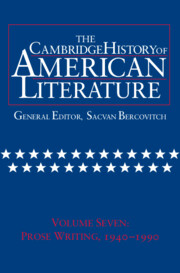Book contents
- Frontmatter
- Introduction
- The Drama, 1940—1990
- Fiction and Society, 1940–1970
- After the Southern Renascence
- 1 Introduction
- 2 Robert Penn Warren
- 3 Carson McCullers
- 4 Flannery O’Connor
- 5 Eudora Welty
- 6 Novels of Race and Class
- 7 Novels of Slavery and Reconstruction
- 8 Walker Percy
- 9 Reynolds Price
- 10 Peter Taylor
- Postmodern Fictions, 1960–1990
- Emergent Literatures
- Appendix: Biographies
- Chronology, 1940–1990
- Bibliography
- Index
7 - Novels of Slavery and Reconstruction
from After the Southern Renascence
Published online by Cambridge University Press: 28 March 2008
- Frontmatter
- Introduction
- The Drama, 1940—1990
- Fiction and Society, 1940–1970
- After the Southern Renascence
- 1 Introduction
- 2 Robert Penn Warren
- 3 Carson McCullers
- 4 Flannery O’Connor
- 5 Eudora Welty
- 6 Novels of Race and Class
- 7 Novels of Slavery and Reconstruction
- 8 Walker Percy
- 9 Reynolds Price
- 10 Peter Taylor
- Postmodern Fictions, 1960–1990
- Emergent Literatures
- Appendix: Biographies
- Chronology, 1940–1990
- Bibliography
- Index
Summary
MARGARET WALKER’S JUBILEE
Margaret Walker’s original claim to fame was as the first African American woman to win the Yale Younger Poets prize, for For My People in 1942. Much later, after a career as a professor at Jackson State University in Mississippi (Walker, with Ernest Gaines, is one of the few major African American writers to make her career in the South), she published Richard Wright: Daemonic Genius (1980), a controversial, very unsympathetic biography of Richard Wright, who was a former friend of hers. Her most durable reputation, however, is for Jubilee (1966), a thoroughly researched novel about slavery and Reconstruction, partly based on the recollections of her own maternal great-grandmother, Margaret Duggans Ware Brown.
Tangled feelings are rife in Jubilee. The protagonist, Vyry, is the daughter of her master, John Morris Dutton, of Dawson, Georgia, and his slave Sis Hetta, who later dies in childbirth bearing another of Dutton’s children. Dutton maintains a relationship of false heartiness and cheer with Jake, Hetta’s husband, who is not fond of Vyry. After Hetta’s death, Vyry is sent to the Big House, both to learn to cook under the tutelage of Aunt Sally and to serve as a playmate for her half sister, Lillian. Dutton is a feckless and irresponsible man who does not acknowledge Vyry, although finally he seems to be less the villainous tyrant than a bluff, rather foolish squire. In fact, because he is more interested in state politics, he does not even pay close attention to the workings of his plantation.
- Type
- Chapter
- Information
- The Cambridge History of American Literature , pp. 375 - 391Publisher: Cambridge University PressPrint publication year: 1999

